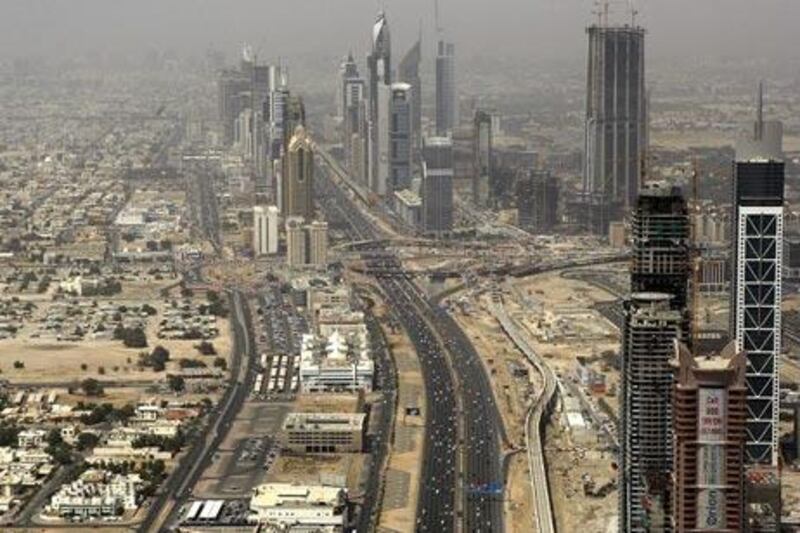The blueprint for Gulf countries is clear - spend your way out of potential recession. Temporary budget deficits are a small price to pay in the short term. The Dubai Government has followed Saudi Arabia and Oman in announcing increased government spending, leading to planned deficits in their 2009 budgets. The sizes of the official deficits range from Dh4.2 billion (US$1.14bn) for Dubai to 65bn riyals (Dh63.66bn) for Saudi Arabia, assuming both expenditures and expected revenues are on target. Herein rests the dilemma for the Gulf. Major world economies are falling into deeper-than-expected recessionary trends, and their expected recovery dates are being extended to 2012 and beyond. The new US president, Barack Obama, must have seen the inside figures of US finances and economic prospects before he pronounced that the nation was "sick". To avoid the American economy falling into a long-term coma, Mr Obama will need all his political skills to push through his proposed $800bn - but most probably $1 trillion - expansionary expenditure programme. This is the US though, and it is at liberty, again in the short term, to print whatever deficit billions of dollars it thinks it needs to spend its way out of a recession that is fast turning into an economic depression. For the Gulf countries it is another matter. A small deficit here and there in the overall national accounts for the sake of maintaining public confidence and getting the regional economies moving again might seem a light price to pay. It is the continuing deficits and pace of a regional recession that is more worrying. The main issue is that small deficits could again balloon, as it was not too long ago that economic giants such as Saudi Arabia registered accumulated domestic debts of close to 90 per cent of GDP, putting strain on bank non-government lending. This time around, it is argued that Gulf economies are in a better financial shape, thanks to accumulated foreign exchange reserves and oil surpluses, to withstand a few years of budget deficit spending. The worry is that in reality there could be divergence between planned and actual deficits. In analysing the projected deficits for the coming year in some Gulf countries, one is struck by the fact that there is an implicit assumption that some expenditure has to be curtailed, compared with the actual expenditure levels of 2008, if the forecast 2009 deficits are to make sense. This might be easier to realise during more "normal" global economic and financial market conditions, but seems unsustainable given the public announcements by Gulf countries that most projects are on track and expenditure patterns will be sustained on par with the previous year, if not even increased. And so we are faced with two scenarios - either actual expenditure will be larger for many Gulf countries, and hence their planned deficits will be larger, or that planned expenditures will be stretched over longer periods to reduce public deficits. In these extraordinary times, the latter strategy will only cause more economic anxiety and erosion of public confidence, given that government economic stimulus is still the main engine of growth, despite brave efforts at diversifying the Gulf economies away from oil and government expenditure dependency. The brutal fact is that economies such as Dubai's, hailed as the most diversified Gulf economy, have also suffered in the global financial turmoil and the emirate's decision to run its first budget deficit indicates the limits of private-sector diversification. Should Gulf citizens be worried? The answer is that despite some bumpy roads ahead, they are in better shape than many economies around the world. Some Gulf countries, especially Saudi Arabia, are aggressively pursuing their ambitious capital expenditure programmes, as evidenced by the 225bn riyals outlay planned by the Saudis for the coming year, compared with an actual expenditure of 144bn riyals for the past year. The kingdom seems to have followed the "golden rule" of the UK prime minister, Gordon Brown, on budget deficits when he was the "iron chancellor", which was to borrow for investments and capital expenditure rather than for current expenditure. Let us hope that the majority of Gulf countries keep to this rule and continue to spend on long-term development projects that will increase their GDPs and national wealth. Foreign banks still like what they see for some Gulf economies, especially those with substantial accumulated international reserves and comparative advantage in products such as petrochemicals and energy. The onus on Gulf governments is to curtail expenditures that do not add value in the long term, and to remember the wise saying reminding us to beware of little expenses, as a small leak will sink a great ship. Dr Mohamed A Ramady, a former banker, is a visiting associate professor in the finance and economics department at King Fahd University of Petroleum and Minerals in Dharhan, Saudi Arabia.
Gulf economies to spend their way out of recession
The blueprint for Gulf countries is clear - spend your way out of potential recession.

More from the national




